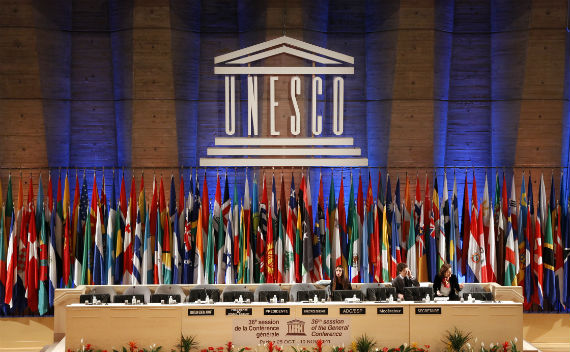UNESCO and After: Multiple Wrongs Won’t Secure Rights
More on:

The vote by UNESCO to admit Palestine as a full member distracts international attention from the only efforts that will make Palestine a genuine reality: negotiations and state-building efforts on the ground. No good has emerged from the past twenty-four hours’ developments, but already we are seeing considerable harm.
First, UNESCO’s vote encourages PLO chairman Mahmoud Abbas to pursue a strategy that only harms Palestinian aspirations to statehood, as I argued in Foreign Affairs in September. Yet, having secured the UNESCO membership, Palestinians will accelerate their internationalization efforts. Today, their top UN envoy in Geneva announced that they will seek membership in over a dozen other UN agencies, including the World Intellectual Property Organization, the World Health Organization, and the International Labor Organization. This will distract international diplomacy away from resolving the Israeli-Palestinian conflict and instead politicize many UN agencies that do important work.
Secondly, the Obama administration’s reaction—immediately cutting off aid to UNESCO in response to U.S. legislation—harms U.S. interests elsewhere. UNESCO mainly underwrites projects that have nothing to do with the Israeli-Palestinian conflict. For example, in Afghanistan UNESCO is working to bolster the literacy of the Afghan National Police and is leading the country’s largest education program reaching some six hundred thousand Afghans. At a time when Washington has sought to employ the United Nations as an instrument of multilateral action, cutting off aid to UNESCO seems to work at cross-purposes with U.S. objectives.
Third, having made headway with membership in UNESCO, Abbas will likely step up his push for Palestinian statehood at the Security Council. However, the Palestinians do not appear to have the nine votes that would trigger a U.S. veto—Bosnia yesterday announced that it will abstain. This will not deter the Palestinians from seeking a vote that they will likely lose. Once they are defeated at the Security Council, the Palestinians intend to shift their efforts to the General Assembly, where they will likely gain the status of non-member state. This will confer upon Palestine the ability to challenge Israel in multilateral fora such as the International Criminal Court. Such a step will doubtless ignite strong Israeli countermeasures.
Indeed, the UNESCO vote already has precipitated an Israeli backlash. The Israeli government just met several hours ago and decided to accelerate the construction of some two thousand units in East Jerusalem, the Etzion Bloc, and in Ma’aleh Adumim, a large settlement east of Jerusalem. Israel also announced it will withhold last month’s tax revenues that are owed the Palestinian Authority. Rather than harming Abbas, withholding revenues will undermine Prime Minister Fayyad, who will find it hard to pay Palestinian workers’ salaries. This damages Fayyad’s standing personally and bolsters his political detractors within Fatah and Hamas. Through its decision tonight, Israel declared settlement activity a punitive action. And withholding funding harms the one person who is working constructively to build real security on the ground for Palestinians and Israelis alike.
Thus, the unhelpful UNESCO vote has triggered a series of steps that harms the very goal it purports to advance—genuine Palestinian statehood and independence. Rather than encouraging the Israelis and Palestinians back to the negotiating table or even toward simply adopting a more cooperative attitude, the environment is rapidly souring. The actions over the past twenty-four hours do not gain the Palestinians one additional inch of territory, while Israel’s actions will draw attention away from unhelpful Palestinian efforts. With the Israeli-Gaza border heating up again, the situation on the ground—the place where things really count—is teetering precariously on the edge of a deterioration into further violence and bloodshed.
More on:
 Online Store
Online Store
